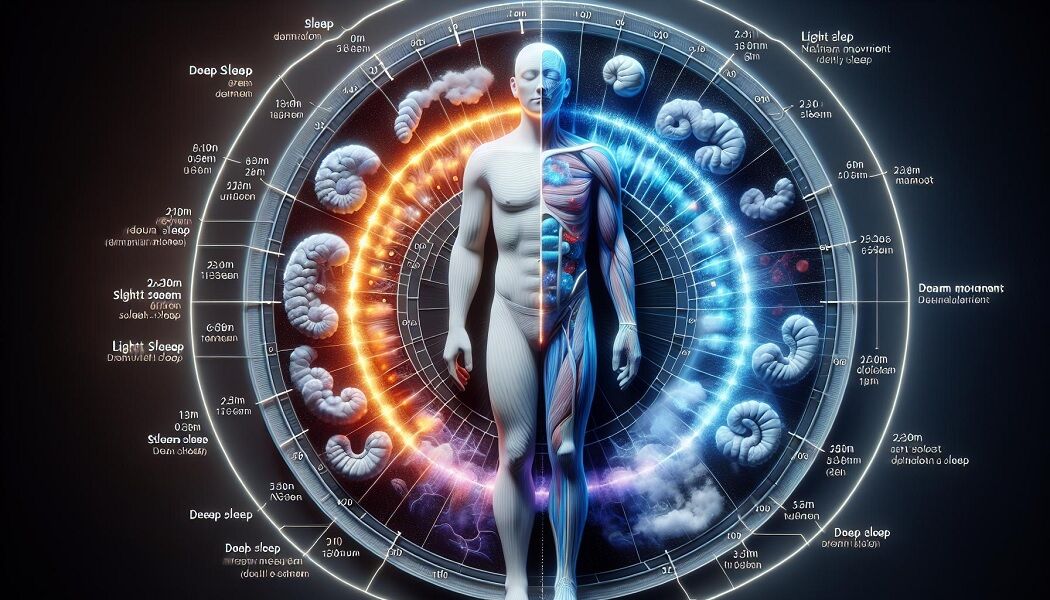Unlocking night-time mysteries: The science behind sleep

Have you ever considered why, despite consuming copious amounts of coffee, nothing surpasses the rejuvenating effect of a proper night’s sleep? This curiosity leads us to explore the intricate science of sleep, an essential yet frequently underestimated aspect of our health. A deeper understanding of sleep mechanisms can revolutionize your approach to rest, guaranteeing you awaken revitalized and prepared for the day ahead.
Sleep transcends mere eye closure and entry into unconsciousness; it is a sophisticated process governed by the body’s internal clock or circadian rhythm. This rhythm dictates physical, mental, and behavioural changes over 24 hours, significantly influencing times of sleepiness and alertness.
Investigating the scientific underpinnings of sleep reveals its extensive influence on health aspects ranging from cognitive performance and mood regulation to overall physical condition. Therefore, if you have experienced difficulties in initiating or maintaining sleep or have felt lethargic after extended periods of rest, this discussion aims to demystify sleep-related complexities. By delving into these insights together, we equip ourselves with valuable knowledge to enhance our nightly slumber.
Importance of sleep
Understanding the science behind sleep reveals its crucial role in maintaining your health and well-being. When diving into why you feel groggy after a short night or refreshed after a solid eight hours, it’s all in the science.
Impact of sleep on health
Getting really good sleep is super important for keeping our minds and bodies in top shape. When we snooze, our body gets busy healing cells, beefing up our immune system, and helping us chill out. Not getting enough sleep can be a downer for our health, making us more likely to run into heart issues, sugar problems, and even unwanted weight gain. Plus, a solid night’s rest is like giving our body’s defence system a big high-five against nasty germs. So, catching plenty of zzz’s isn’t just nice to have—it’s essential for taking care of ourselves all around!
Moreover, mental well-being significantly profits from adequate sleep in terms of both duration and quality. Insufficient sleep has been linked to alterations in mood and heightened irritability due to its integral role in emotional regulation and stress management. A continuous shortfall in sleep may lead to severe mental health problems, including depression and anxiety disorders.
Cognitive benefits
The study of sleep extends into cognitive functions as well. During the sleep cycle, particularly the Rapid Eye Movement (REM) phase, the brain engages in critical processes such as information assimilation from the day’s events, memory consolidation, and emotional regulation. This nocturnal reset enhances learning capabilities, bolsters memory retention, and fosters creativity.
By prioritizing sleep, one is not merely preserving physical and mental well-being but also laying a foundation for cognitive superiority. Whether it involves excelling in academic assessments, addressing complex challenges in professional settings, or enhancing daily attentiveness, the advantages of proper rest extend significantly beyond mere physical restoration.
Stages of sleep

Exploring the scientific foundations of sleep, it is imperative to comprehend its structure, segmented into distinct phases. Each phase serves an essential function in guaranteeing that individuals awaken feeling revitalized and prepared to confront the day’s challenges.
Non-rapid eye movement (NREM) sleep
NREM sleep kicks off your sleep journey and is subdivided into three stages: Stages 1, 2, and 3. You start with the lightest phase, Stage 1, marking the transition from wakefulness to sleep. This brief phase accounts for about 5% of your sleep cycle. As you drift deeper, you enter Stage 2, the core of NREM sleep, occupying around 45% of your sleep time. Here, your brain waves slow, diving into a crucial period for memory consolidation and information processing. The deepest sleep happens in Stage 3, representing 25% of your sleep time in adults. This stage is vital for physical repair and recovery, making it harder to wake up. For a healthy sleep pattern, it’s essential to pass through these stages multiple times each night.
Rapid eye movement (REM) sleep
After cycling through the NREM stages, you enter REM sleep, the realm of dreams. Constituting the final stage of the sleep cycle, REM is when most dreaming occurs, featuring rapid eye movements and significantly different brain wave patterns compared to NREM sleep. This stage, emerging roughly 90 minutes after falling asleep, plays a key role in emotional regulation and memory. Moreover, the brainwave activity during REM sleep is believed to be crucial for learning and processing emotions.
Sleep cycle
Did you know that sleep is like going on a little journey every night, not just flipping between Non-Rapid Eye Movement (NREM) and Rapid Eye Movement (REM) sleep? It’s more like hopping on a cycle that lasts about 90 to 110 minutes, and guess what? We do this dance four to five times in a typical seven to nine hours of snooze time. We kick things off with NREM sleep, easing from light into deeper stages, before diving into the dreamy world of REM sleep. And as the night marches on, the mix between NREM and REM changes up, with REM getting its groove on more as morning creeps closer. Getting why this whole cycle matters helps us appreciate how crucial zzz’s are for keeping our minds sharp and bodies ready to tackle whatever the day throws at us.
Factors affecting sleep

Sleep, a complex and vital process, isn’t just about the number of hours you tuck in. It’s a symphony where various factors play crucial roles. Let’s explore how different elements influence your sleep quality and duration.
Environmental factors
Did you know that the vibe of your bedroom can make or break how quickly you nod off and how well you sleep through the night? Light plays a huge role in this. Soaking up some natural sunlight during the day helps keep your body clock ticking just right, but at night, the blue light from screens can trick your brain into thinking it’s still daytime. Noise is another sleep stealer. From cars zooming outside to someone snoring next door, unexpected sounds can jolt you awake. And let’s talk about temperature – keeping it on the cooler side in your room can help you drift into dreamland more easily than if it were too warm.
Lifestyle choices
It is well-documented that daily habits significantly influence sleep quality. Indeed, dietary consumption, particularly of caffeine found in coffee, tea, and certain sodas, can impede the process of falling asleep. Furthermore, while alcohol may initially appear to facilitate a quicker onset of sleep, it frequently disrupts sleep patterns later in the night.
Regarding physical activity, it is universally acknowledged that exercise promotes improved sleep quality. Engaging in physical activities during morning or afternoon hours is advisable for enhancing sleep efficiency. However, it is recommended to avoid vigorous exercise close to bedtime as it may result in difficulties initiating sleep.
Medical conditions
A multitude of medical conditions significantly diminishes an individual’s capacity to experience restorative sleep. Disorders such as sleep apnea, restless legs syndrome, and insomnia notably impact the quality and duration of sleep. Moreover, ailments not directly associated with sleep, for instance, diabetes and heart disease, can also indirectly modify normal sleeping patterns. It is imperative to manage these conditions under the guidance of healthcare professionals.
It’s super important to remember that sleep is way more than just chilling out. It’s a key time when our body and mind get to fix themselves up and recharge. By figuring out and tackling any sleep problems, we can boost the quality of our zzz’s, which in turn makes us feel a whole lot better overall.
Tips for better sleep
Comprehending the science of sleep enables individuals to make educated decisions concerning their bedtime regimen. By addressing environmental influences and lifestyle choices, one is taking a considerable step towards improving the quality of their sleep. It is imperative to manage any underlying medical conditions with professional assistance as well. Adopting these modifications will lead to a notable enhancement in both physical and mental health. Here’s to improved nocturnal rest!
In Thailand, the exploration of telehealth marks a transformative shift in healthcare delivery. This burgeoning technology promises to democratize access to medical services, bridging the gap between urban and rural communities. As we delve deeper, it becomes clear that telehealth could very well be the cornerstone of Thailand’s healthcare future.

































